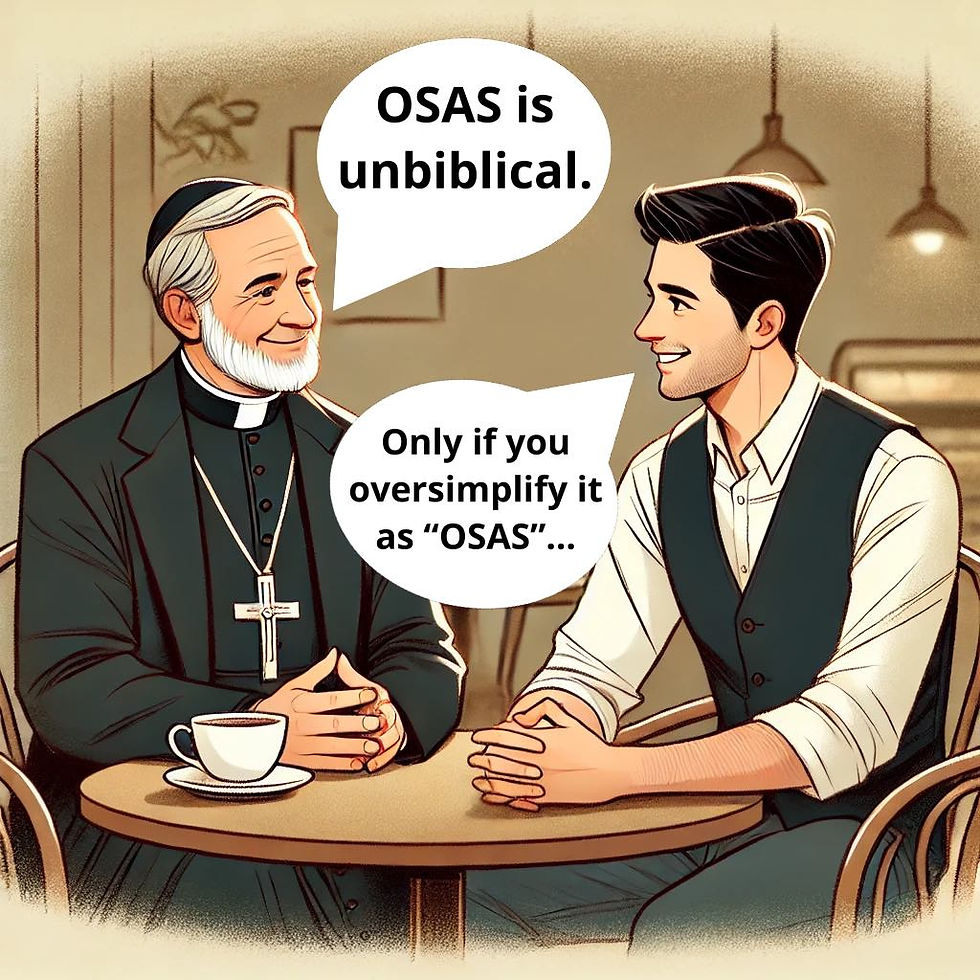The backwards hermeneutical approach of Calvinism
- Bible Brian

- Jan 10, 2022
- 4 min read
Updated: Jul 29, 2023

Astute Bible students will know that understanding the Bible varies in difficulty throughout its Holy pages. Some things, such as the book of Genesis, are fairly easy to understand. Other times, such as the book of Proverbs, it seems almost as if God is being deliberately obscure. In fact, things like parables were quite explicitly said, by none other than Jesus, to intentionally cloud people's understanding (Matthew 13:13-16).
With this in mind, a key rule in interpreting Scripture is that the clear interprets the unclear. If you have two verses on a given topic, one of which seems obscure or ambiguous, but the other seeming very clear, you understand the unclear verse in light of the clear. For example, is baptism necessary for salvation? Scripture makes it abundantly clear that salvation is by faith alone, not of works (baptism being a work). Nevertheless, there are verses which, taken on their own, may seem to suggest baptism is essential to salvation. The clear interprets the unclear, so we must rule out any interpretation of the unclear verses which seem to suggest baptism is necessary for salvation.
When it comes to Calvinism, this concept is reversed. Scripture makes it abundantly clear that:
God takes no pleasure in the death of the wicked (Ezekiel 18:23, 32; 33:11)
God wants all men to be saved and come to the knowledge of the truth (1 Timothy 2:1-4)
God isn't willing that any should perish but wants everyone to come to repentance (2 Peter 3:9)
God commands all men, everywhere, to do so (Acts 17:30)
Jesus' death was for the whole world (John 3:14-16; 1 Timothy 2:6; 1 John 2:2)
Above are just a few examples of Scriptures that are quite out of step with Calvinism. Calvinism suggests that not only does Jesus' death not cover those who end up not believing, but that God, in His sovereign power, does not even desire these people to be saved. Because of the unclear verses, it seems fair that Calvinists would believe this. In fact, although I vehemently disagree with Calvinism, I simple cannot bring myself to call it a heresy simply because I can understand why Calvinists might draw their conclusions. The Bible really does speak about predestination and the like. In fact, with Limited Atonement being the exception, a strong Biblical case can be made for all 4 of Calvinism's other points. However, when all Scripture is taken together, with the clear being used to interpret the unclear, Calvinism ultimately falls short.
To give an example, let us compare 1 Timothy 2:1-6 with Matthew 20:28 and Mark 10:45. In 1 Timothy 2:1-6, we are clearly told "I exhort therefore, that, first of all, supplications, prayers, intercessions, and giving of thanks, be made for all men; For kings, and for all that are in authority; that we may lead a quiet and peaceable life in all godliness and honesty. For this is good and acceptable in the sight of God our Saviour; Who will have all men to be saved, and to come unto the knowledge of the truth. For there is one God, and one mediator between God and men, the man Christ Jesus; Who gave himself a ransom for all, to be testified in due time."
Although there are ways Calvinists interpret this verse to try to fit Limited Atonement, up to and including literally adding to the verse, this passage clearly tells us that salvation is intended for all men. We are to pray for all men, and no exceptions are given. We are told that God wants all men to be saved and come to the knowledge of the truth, we are told of no exceptions. Paul tells us Christ gave Himself as a ransom for all, not one exception is listed anywhere in Scripture. This passage is so clear that if you made a window out of it, birds would constantly fly into it.
Matthew 20:28 and Mark 10:45 contain a similar phrase. In both verses, Christ Himself tells us He came to give His life as a ransom for many. Many, of course, does not mean all. It can mean all. Observe:
Bill: I have had many cookies today.
Ben: How many?
Bill: All of them.
Nevertheless, many does not mean all. To determine how many, we must look at the context. In the above example, many does mean all, and we know that because Bill clarified. In the case of Scripture, Christ must mean "all" when He says "many" because Paul clarifies He gave Himself as a ransom for "all". This cannot be flipped around. You can interpret "many" as "all" because many is an ambiguous word that can mean all. "How many?" "All of them". Can this be flipped? "How all?" "Many of them". This just doesn't make sense. All is not an ambiguous term, like many.
When you interpret the unclear in light of the clear, you end up forming a coherent theology based entirely on the word of God. As a non-Calvinist, I am free to let "all" mean "all", "world" mean "world", and leave every verse in the Bible completely unedited. By contrast, when you interpret the clear in light of the unclear, you inevitably end up having to twist, and in some cases even alter the clear in order to make the clear fit with your interpretation of the unclear. Calvinists, in order to maintain their views, are forced to wrestle with many Scriptures, all of which, when left unedited, at the very least appear inconsistent with Calvinistic theology. Therefore, if we are to take God's word as it is written, it is imperative that we reject Calvinism.






Comments